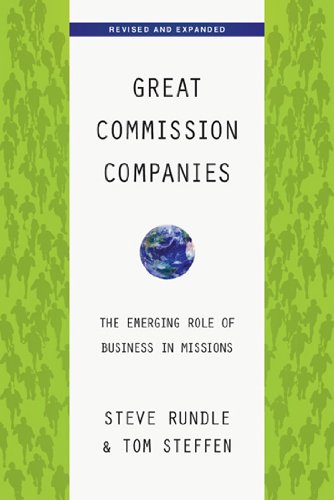A Brief Book Summary from Books At a Glance
About the Author
Steve Rundle is associate professor of economics and business as mission at Biola University. He is the editor of Economic Justice in a Flat World: Christian Perspectives on Globalization. Tom Steffan is professor of intercultural studies at Biola University, where he directs the Doctor of Missiology program. He was a missionary to the Philippines for fifteen years, and he is the author of a number of books on missions and cross cultural ministry.
Introduction
In the last decade, a movement has begun in which business people and missionaries are overcoming the secular and sacred dichotomy. Conferences, books, and programs are appearing to discuss the emerging role of business to further God’s mission to the world. This book surveys the theory behind doing business as mission with “Great Commission Companies” (GCC) as the main focus. The second part of the book gives six case studies of GCC’s and their owners.
Table of Contents
Chapter 1 – The Good News About Globalization
Chapter 2 – Toward a Definition of a Great Commission Company
Chapter 3 – Globalization and Business
Chapter 4 – Globalization and Missions
Chapter 5 – Turning Vision into Action
Chapter 6 – Sustaining Success
Chapter 7 – The Sild Road Handicraft Company
Chapter 8 – Bajalia Trading Company/Bajalia International Group
Chapter 9 – Little Texas
Chapter 10 – Global Engineering and Management Solutions
Chapter 11 – Olive Technology
Chapter 12 – Pura Vida Coffee
Summary
Chapter 1: The Good News About Globalization
A theological barrier is falling. This barrier has created an unwritten and unbiblical spiritual-vocational hierarchy that has dominated our thinking about ministry. At the top are foreign missionaries. Just less spiritual than them are pastors and home missionaries. More “secular” than them are social workers, schoolteachers, nurses and other helping ministries. At the very bottom are business people, trades people, stockbrokers, lawyers, etc. The purpose of this book is to demonstrate how it is both possible and necessary for business professionals—and companies owned by Christians—to become more actively involved in missions.
Great Commission Companies are those who fulfill the great commission through their business efforts, particularly in the most unreached parts of the world. Coincidentally, these unreached parts of the world house about 90 percent of the world’s poorest and most suffering people. Business has the power to impact virtually every person on the planet in a way that traditional missions does not. Business owners have the remarkable ability to integrate evangelism and discipleship into natural workday situations rather than forced situations outside of business hours. They also have a web of human interactions on a daily basis that traditional missionaries envy.
Missions communities have been reluctant to work closely with business for three reasons. First is the idea that work takes time away from ministry. Second is the belief that business can either serve society or make money, but not both. Third is that it creates complications for a ministry’s tax exemption. But GCCs overcome all these obstacles by making business and missions one integrated venture.
There are various types of GCCs that can be measured by variables. First is the nature of the company’s participation in the missions effort. Second is the company’s level of independence from churches and missions. Third is whether the business is legitimate, adding value to society, or simply a cover for entry into a country. Fake businesses are detrimental to Christian witness because they add no value to society and create suspicion for all missionaries in the country (they might be terrorists or spies). In contrast, the purpose of a GCC is “to bring good news in word and deed to the neediest parts of the world. The good news about globalization is that the barriers that once prevented people from hearing this message are falling and the missions baton is being handed to a new breed of messenger” (29).
Chapter 2: Toward a Definition of a Great Commission Company
Mission is God’s all-encompassing plan of reconciling the world. Missions is the church’s effort to advance God’s mission. There is an intentional effort to make Christ known. While some want to call all Christians today “missionaries,” it is best to reserve the term for those who cross cultural boundaries while referring to those who advance God’s mission at home as “world Christians” or “kingdom professionals.”
Of the Great Commandment and the Great Commission, which comes first? Fundamentalists have favored the Great Commission, while classical liberals have favored the Great Commandment. Holistic Christian ministry must uphold both commandments simultaneously, so we advance the following assumptions about such ministry. First, we have been created for good works (Eph 2:10). Second, good works will create opportunities to share good news. Third, authentic missions meets real. . .
[To continue reading this summary, please see below....]The remainder of this article is premium content. Become a member to continue reading.
Already have an account? Sign In
